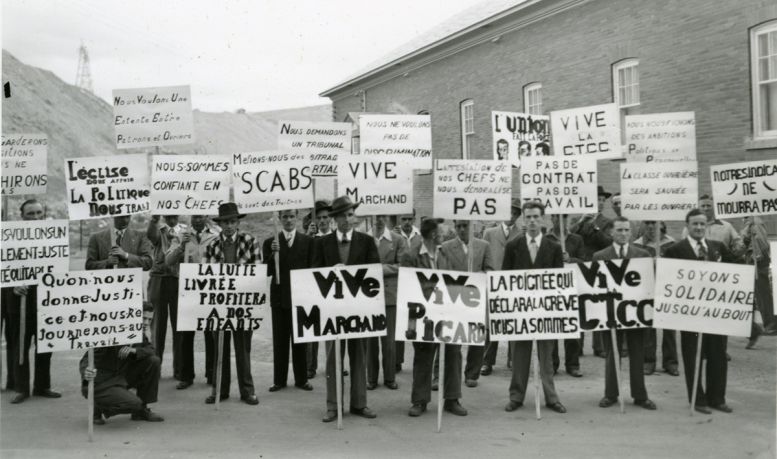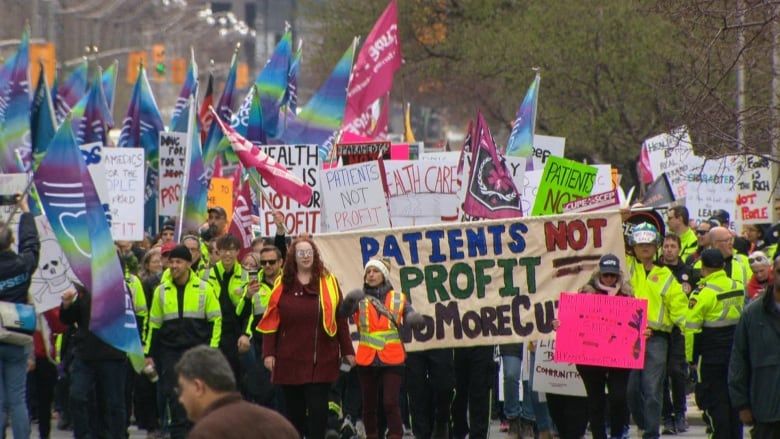Unsurprisingly, the Coalition Avenir Québec (Coalition for Quebec’s Future, CAQ) under François Legault won a second term in the province’s election. The far-right libertarian Québec Conservative Party, led by Éric Duhaime, votes grew dramatically. The Liberals and Parti Québécois, which dominated elections for years, continued an ignominious decline. Meanwhile, Québec’s reformist left stagnates and ignores the working class.
In the October 3 election, Québec’s political landscape moved further right. The “neutral” political compass of the state’s television network, Radio-Canada (French division of the CBC) described the traditional capitalist parties of Québec, the Liberals and the Parti Québécois (PQ), as leftist organizations!
François Legault’s CAQ increased its support by 4 percent to 41 percent. But with the first-past-post system, they increased their seats in the National Assembly by 14, jumping from 76 to 90 of the 125 seats. This is despite their catastrophic management of the COVID crisis, pro-boss policies and a discriminatory discourse against immigrants.
Québec solidaire (QS), the left party, gained one more seat but lost 15,000 votes. It still was the second largest party in the share of the vote, 15 percent, but not in seats elected. In the context of a polarized election, this was a missed opportunity.
Why did so many Quebeckers vote for a party that pushed for or are associated with public service cuts, investments in the largest and already massively profitable corporations, the right to pollute and corruption scandals?
A Volatile Situation
The right’s domination hides deep instability. As a third of registered voters did not vote about 65 percent of them supported neither the CAQ nor Éric Duhaime’s Conservatives. The economic instability, with rampant inflation, on top of the COVID disorder, feeds growing frustration and social unrest; many people are losing faith in the status quo and are looking for new solutions. This radicalization benefitted the Conservatives, gaining 470,000 votes compared to 2018.
As the Bank of Canada and other central banks internationally push up interest rates, this adds to people’s woes as it increases mortgage and debt repayments. Higher interest rates and other factors are pushing the world towards a new recession. As life becomes more difficult people will be pushed to consider more radical solutions. Support for radical right and left ideas and methods grows, while the center dries up. Polarization is widespread.
The CAQ and the Conservatives are currently benefiting from the radicalization because they focus on popular ideas within Quebec, particularly pushing nationalistic identity. The two parties are also good at putting forward simplistic slogans, which seem to offer solutions.
A key factor in the rise of the populist right, in Québec and internationally is the failure of the mainstream left. The PQ was once seen as a left sovereigntist party, with social democratic influences. In 1983 it applied to join the Socialist International (not a real socialist international like ISA) but was blocked by the NDP. Over the years, like many social democratic parties, it moved to embrace austerity and neoliberalism. As it moved to the right, it increasingly adopted nationalist and xenophobic policies, to hide its nakedness.
The CAQ took these policies even further, making them core ideas of its existence. The rise of the CAQ and Conservatives is in part rooted in the failure of the PQ to fight for and defend working-class people.
The right seems strong because the political left and working-class organizations are weak or quiet. Currently, there is a one-sided ideological attack. However, the situation is ripe for a new political organization that would mobilize the working class on policies for working people. Such an organization would explain the current situation through the lens of class conflict, and push for an empowering, socialist, political vision that would have equal if not superior potential for growth.
Historical Low of Class Conflict
There was no cohesive working class or social movement activity during the election. Recent campaigns have struggled to maintain their organization and mobilization over long periods of time. None oriented themselves to the masses during the elections when people are most open to discussing politics. The strategy of most movements is to ask the government to listen to them, based on the power of their logic, rationality or appeal to reason. They didn’t build power to be able to push the government. The only movement that continued to mobilize people during the election was the opposition to COVID public health measures, which tapped into the mood from the “convoy” and drew in anti-vaxxers.
While the right can mobilize regularly, the spontaneous social movements of the left had higher levels of participation. Protests against femicides, police brutality, climate change, rent hikes, and for Indigenous, Palestinian or Iran people’s democratic rights show that there are causes that can mobilize people. Trade unions were able to win many victories, but when they did, they focused on specific industries and companies. They did not work to a wider movement. This is in contrast to some European countries where unions have mobilized large numbers to fight against inflation.
Québec’s social and trade union movements lack a wider political vision for our class. There is significant potential to mobilize on the ground, get participation cards signed, create action committees and organize communities with the goal of going further than occasional single-issue marches. To win government actions, the working class has to build its strength and power to force the ruling class to concede policies that benefit workers. The most powerful weapon is the organized threat of mass economic disruption. This can only be realized through building solidarity between communities and workplaces, with clear demands and an on-the-ground strategy.
Such an approach would go a long way towards building a common identity through the shared experience of standing and fighting together, uniting a diversity of languages, religions or origins. The working class needs a strategy to build power together and policies that includes all the needs of the working class and pushes them forward.
Without this approach, the ideology of the ruling class will continue including the idea that politics is only a thing done every four years, by voting. This perspective contributes to lower voting rates, eco-anxiety and “doomerism,” especially for young people.
Québec solidaire tried to make themselves the “last chance” vote, but that did not result in a boost to their votes. The Conservatives and the CAQ succeeded in imposing their vision of society.
Significant Voter Abstention
Mainstream media often point to young people’s lower voter participation to explain the discrepancy between electoral results and social tendencies. However, abstentionism was high for the entire population in 2022, just like it had been in 2018. More than one-third of eligible voters did not show up at the voting booth. Working-class neighbourhoods and poorer communities have lower voting rates, with First Nations communities having the lowest.
Generally, 18- to 35-year-olds are less likely to vote. This is mainly due to their feeling that voting won’t make much difference and an awareness that most politicians do not deliver what they promise. This does not mean that young people do not participate in, or express political views, they simply are elsewhere. Current political parties are incapable of inspiring many young people to vote in elections. Most young people who do vote support QS or the Conservatives, the two polarizing parties.
When a politician puts forward bold socialist policies, they get a powerful response from young people as was demonstrated by Bernie Sanders, Jeremy Corbyn and Jean-Luc Mélenchon
CAQ: Representing the Interests of “Authentic” Quebecers
Part of the CAQ’s popularity came from its concrete measures to “fight inflation” including sending $500 per Quebecers and promises to lower taxes. However, most of Legault’s campaign centred around reinforcing its xenophobia against immigrants. This propaganda has been core to the party since the start of their government in 2018. They claim that the CAQ is the only party that represents “true” Quebecers. This “authentic” so-called nation is white, Catholic, francophone and, much like Legault, awkward and out-of-date. However, without serious opposition, the CAQ won this cultural offensive by focusing on religious symbols, threats to the French language and the dangers of immigrants who apparently take advantage of Québec’s services.
Trade union and QS leaders sometimes agree with this claim of the CAQ. The members of these organizations sometimes mobilized themselves against their leadership, for example in the fight against Bill 21 (which prohibits certain public servants from wearing religious attire) and Bill 96 (which strengthens the French language charter). By making the political debate about culture, language and identity, while not considering economic and class divisions, the CAQ presented itself as the only legitimate nationalist voice in Québec.
Legault also used economic nationalism to position himself as the Québec nation’s defender, including both the working class and billionaires. With its cultural nationalism, the CAQ pretends to be the best “shield” against exterior “threats.” This nationalism explains social issues through a local and cultural lens first; Quebecers are taken advantage of by external actors. The CAQ claims that without them and their different identities, everything would be fine. In this context, it becomes harder to differentiate the interests of the working class from other classes.
This strategy has the benefit of hiding the causes of the economic crisis. It legitimizes big business that actually contributed to the crisis. By creating a cultural straw man, the CAQ blurs and hides class conflicts in the background. Under a CAQ Quebec, the interests of the bourgeoisie and the working class would be one and the same!
These ideas have a powerful predecessor in Duplessis and Union Nationale, the party that dominated Québec from 1936 to 1959, whose regime is widely-known as la Grande Noirceur (the Great Darkness). Duplessis was vehemently anti-union.
The Emergence of a New Reactionary Vote
The Conservatives’ electoral leap was the most surprising outcome, jumping from 59,000 votes in 2018, to 531,000, 12.9 percent of the votes cast. Their level of support now rivals the PQ (14.6) and the Liberals (14.4). Its leader, Éric Duhaime, has long been a figure of the right of Canadian politics, supporting Stockwell Day when he led the Canadian Alliance twenty years ago. Duhaime was a right-wing journalist in print and on television and radio.
With the so-called end of the pandemic, many pundits are writing off the Conservatives, saying they missed their chance of getting anyone elected. This is a mistaken perspective. The pandemic is not over; new variants are continuing to be discovered, and COVID-related deaths in Québec have already more than doubled those of 2021, with still two few months of 2022. The mounting economic crisis, caused by the contradictions of capitalism, will continue. The Conservatives can continue to channel new disillusioned layers into its ranks, especially while the mainstream left continues to push an abstract, idealist program that does not aim to build roots in social movements.
Despite its name, the Conservative party pursues ultra-libertarian objectives. The declarations of its representatives are all over the place; some are against abortion rights while others are against the vaccine. What unites them is the defence of small- and medium-sized businesses, or even large ones. The party leader wants to privatize state-owned enterprises like the SAQ (public wine and spirits) stores and the healthcare system. Duhaime pushes for increased hydrocarbon production, in the process sacrificing the environment and trade unions. He has defended the cancellation of all COVID measures since last January. This appeal to personal freedoms has channelled social anger into votes.
The Conservatives were most successful at channelling the widespread anger in society, that was exacerbated by the pandemic years. Private control of the government, namely from the McKinsey consulting firm, and the pharmaceutical industry’s blackmail have never been more evident. The loss of trust in institutions has fermented to such a level that it has spilled over into a distrust of science, especially regarding vaccines. The combative and openly hostile propaganda of the Conservatives towards the government and mainstream media was an effective strategy.
They claimed the enemy was the Legault government. It mobilized 3,000 people to an event in Québec City, the largest gathering of any party during the campaign. The party mobilized hundreds on a demo against COVID public health measures, and Legault and his COVID management.
The party focuses on the theme of freedom, which also happens to apply to small- and medium-sized businesses, to answer the worries of people watching their livelihood go up in smoke. Small business owners, such as gym or restaurant owners, suffered the most losses from COVID measures. The Conservatives represent primarily the interests of this class of people, particularly around Quebec City. Instead of blaming the multinational corporations that are making record profits, the Conservatives attack the “weight of bureaucracy” (in both the State and trade unions) and stifling taxes. Duhaime supported the “convoy” and channelled that into electoral support.
The Conservatives claim that “hard work pays off” and their rhetoric for “individual freedoms” to build a business gains an echo in a layer of the working class who hope to become business owners one day. The rhetoric argues that by “liberating” companies from taxes, unions, and environmental norms, profits will increase. However, profits for who? A very select segment of the population, at the cost of workers’ living standards, health and safety, and the environment.
The entire world is facing inflation, recession, ruptured supply chains, war and increased inter-imperialist tension. It is delusional to think that a bourgeois party can reorganize Québec society in isolation from this global situation.
Traditional Parties in Crisis
Québec’s traditional parties, the Liberals and the PQ, had their worst performance in more than 50 years. They are melting both in votes and elected MPs. The Liberals remain the official opposition party with 21 elected representatives, despite only having 14 percent of the popular vote, most of it concentrated in Montreal.
Quebec’s electoral system meant the PQ, with its votes spread much more across Québec, only elected 3 MPs despite having 10,000 more votes than the Liberals.
Political Programs and Social Division
The electoral result echoes what had been measured by trade union polling. Polls done a few months before the election showed strong support for the CAQ and the Conservatives among unionized workers. What is happening?
Support for a party’s political program did not appear to be the most important factor in determining people’s votes. If it was, it would be difficult to explain why people would vote for political organizations that promise to lower their standards of living and pollute their environment.
The socioeconomic profile of the electorate is a much more reliable variable to explain party support, more than regional divisions that have been the focal point of Quebec’s mainstream media. A Mainstreet poll shows that QS support comes mostly from people with middle-class, educated backgrounds, who are young and are beginning their careers. This vote is concentrated in urban, recently gentrified francophone neighbourhoods within Montreal. Conservative support is the mirror opposite of QS; their votes come from the wealthy, both young and old, living outside Montreal. Slightly more anglophones supported the Conservatives than francophones. The CAQ attracted the least educated, poorest and oldest francophones living outside Montreal.
Quebec solidaire – Missed Opportunity
While QS gained the second most votes of any party – 15.4 percent – this was a missed opportunity in the context of a polarized society and election. People are angry and looking for answers.
Its campaign centred around climate change, access to housing and taxing the rich enabled QS to consolidate a young, urban, educated, and middle-class electorate. However, it failed to break through the “national identity” slogans of the CAQ, counterpoising that with strong working-class policies.
During the election, the unions and QS had similar opportunities to the CAQ and the Conservatives to put forward their analysis and answers. However, because they did not appreciate the changing political mood, they “copy and pasted” their 2018 approach. If moderate ideas were not effective before the pandemic, they were absolutely worthless now. A poll found that twice as many people trusted the libertarian solutions of the Conservatives to the upcoming recession as those put forward by QS!
How do we fight, and win, against the right?
The way to solve the current crisis will not arise from the idealism of either the current “left” or the “right.” They can only come from the working class organizing by itself and for itself. Québec has never had a political party or government that defended the interests of the working class. Québec has never had a working-class or social democratic party elected to its parliament.
Yet, some of the biggest reforms in North America were won by Quebec’s working class. The public sector has one of Canada’s higher rates of unionization, the kindergartens are some of the cheapest, and the local health clinic network (CLSC) and relatively lower tuition fees are all examples of the gains that have been won. These victories show that it is possible for the working class to win, without having a “leftist” majority government. Quebecers have historically won by organizing the majority of the working class in their workplaces and in their communities. To reach these high levels of mobilization, clear demands were put forward and mobilized around. Right and centre-right political parties were then forced to give an olive branch to the working class, in an effort to get them to calm down and go back to work. Of course, capitalism constantly seeks to undermine working-class gains over time. Reforms and wins are but one step towards the political emancipation of our class, through the complete taking over of the State in the interests of the working class, and expropriating the bourgeoisie and its political control.
Naming Our Enemies
Identifying who benefits from low salaries, discrimination, sexism, privatization of services, and building hundreds of empty condos is of vital importance. Those who benefit from class oppression are not the workers’ allies. They should not be included in the organizations of the workers, the poor and the oppressed. All they will do is try to dilute the demands and demobilize forces. Pointing at the benefactors of exploitation – the economic elite – makes clear who actually creates wealth in our society: the working people of the world.
It is the workers that produce and distribute the goods and provide services. The capitalists, speculators, bankers and large stockholders, merely cream off their wealth from others’ labour. They are parasites. Now is the time to end production for the profits of the few. Instead, production should be in the interest of the many, people’s health, the climate and the biosphere.
The working class has the potential to mobilize itself and organize a better society because it suffers the alienation and exploitation of capitalism. It has the power to stop society, nothing moves without the working class. Workers should lead the workers’ movements. Well-off “experts” are comfortable with and largely benefit from the status quo.
Where the Danger Comes From
Instead of examining the result of its weak program, QS’s leadership explains the party’s stagnation is because Quebec is going through a “CAQist wave.” Across the world, the liberals and soft-left suffer loss after loss. They all try to argue that their situation is somehow the right’s fault. They miss the fact that this is an open admission of their own weakness and lack of political vision. There is no CAQist wave. The CAQ only did slightly better than in 2018. What has happened is that the global capitalist crisis has intensified a reactionary wave. The heights achieved by the Conservatives are QS’s punishment for being incapable of reaching out to the angry masses in an effective way. If there is a segment of the population that must be won over by socialist methods and analysis, it is the CAQ voters.
The social and economic conditions in Quebec will worsen in the upcoming period. The attacks against living standards and democratic rights will increase. To fight against the capitalists who dominate all the political and economic levers, workers should look to socialist methods that empower them. To fight against an ever more consolidated enemy, workers must build a concrete, organized, ongoing political movement that grows through solidarity
The Role of Elected Representatives
Overall, QS MPs have a positive relationship with social struggles. They defend them in the media and in the parliament. However, that is not enough by itself to build the movement needed to win. It is not enough to force the CAQ and the capitalists to legislate policies in favour of working people. Losing can be a motivating factor if people learn that they’ll need clearer policies and strategies and also work harder. Winning, also, can be a motivating factor. By winning, the working class can learn that it has the power to change society. The reforms that potentially could be won would not only help the people now but also can contribute to the momentum of our movement.
Even if QS MPs participate in local protests, or have assemblies on thorny political topics, these methods fall short of connecting with larger social movements or contributing leadership to them. What needs to be done, one way or another is for the movement to come up with its own demands, and for QS to mobilize around them using their positions as MPs. To do that, QS will have to change its methods and its relationship with the working class.
The responsibility of a real “party of the street” (QS’ own description of itself) is to act as the spark and catalyst for social movements. Far from speaking “on behalf of” the people or exercising power in parallel, on their behalf, QS should prioritize the political education of working people, and help them to build movements and leadership capabilities. Québec’s working class needs a political force that goes on the offensive, initiates struggles, takes a long-term perspective and organizes people strategically against the elites.
Becoming Aware of Our Strength
It is an absolute waste of time to expect the CAQ to do anything through reason, facts and arguments. It has no interest in the working class and will neither work with it nor listen to it. Any chance of forcing the CAQ to act in the interests of the many, requires a mass political organization that understands its strength and is based on the mobilization of the working masses.
Building this political organization requires that social and working-class movements begin to work with each other in their everyday struggle. This involves transforming defensive policies into offensive ones that solve the problem for wider layers of the population, wider than single social or trade union organizations struggling at a particular point in time.
The anti-COVID protests organized by the radical right and small business owners have disrupted society. They have rattled the Legault and Trudeau governments. Imagine if trade unions, in Québec and across Canada had shown similar determination but with better strategies! Linking together in joint action and struggle could win important concessions including better protections against the pandemic, indexed salaries, better public services and meaningful actions to tackle climate change.
The upcoming public sector negotiations represent an excellent opportunity to unite trade union demands and build a wider political force in the interest of the entire working class of Quebec. But to win requires learning lessons from the failures of BC’s public sector unions.
The example of Kshama Sawant, a Socialist Alternative councillor in Seattle, demonstrates the potential for such a political force to be built and to win against the elite. She shows that a single elected representative, with the correct strategy towards building mass movements and the backing of a Marxist organization, can force mainstream liberal politicians into passing reforms.
Building this political force is the main purpose of Alternative Socialiste, and International Socialist Alternative (ISA). Building a world where we decide collectively what is prioritized by taking into account humanity’s collective needs, the production potential and the limitations of the planet is more important than ever.




